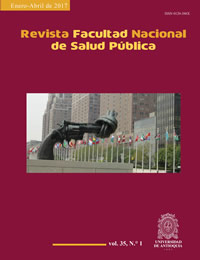Educational Efficacy in the Metabolic Control of Diabetics with Peritoneal Dialysis
DOI:
https://doi.org/10.17533/udea.rfnsp.v35n1a06Keywords:
diabetes mellitus, peritoneal dialysis, kidney disease, health education, multiple linear regressionAbstract
Downloads
References
(1). Danaei G, Finucane M, Lu Y, Singh G, Cowan J, Paciorek J, et al. National, regional, and global trends in fasting plasma glucose and diabetes prevalence since 1980: Systematic analysis of health examination surveys and epidemiological studies with 370 country-years and 2.7 million participants. The Lancet 2011; 378(9785): 31-40.
(2). International Diabetes Federation. IDF Diabetes Atlas, 6th ed. Brussels: International Diabetes Federation; 2013. http://www.idf.org/diabetesatlas
(3). Base de datos resolución 4700 / 2008 APB, EOC, Fuerzas Militares y Policía; 2013.
(4). Krishnamurti U, Steffes MW. Glycohemoglobin: a primary predictor of the development or reversal of complications of Diabetes Mellitus. Clin Chem 2001; 47:1157-65.
(5). Khaw KT, Wareham N, Luben R, Bingham S, Oakes S, Welch A, et al. Glycated haemoglobin, diabetes, and mortality in men in Norfolk cohort of European Prospective Investigation of Cancer and Nutrition. BMJ 2001; 322: 15-8.
(6). UK Prospective Diabetes Study (UKPDS) Group. Intensive blood-glucose control with sulphonylureas or insulin compared with conventional treatment and risk of complications in patients with type 2 diabetes (UKPDS 33). Lancet 1998; 352: 837-53.
(7). The Diabetes Control and Complications Trial Research Group. The effect of intensive treatment of diabetes on the development and progression of long-term complications in insulin-dependent diabetes mellitus. N Engl J Med 1993; 329: 977-86.
(8). Martínez F, Rossi F. Enfermedades de Alto Costo, una propuesta para su regulación. Bogotá: Colección de cuadernos FEDESALUD 2002.
(9). Susan L. Norris M. Engelgau K.M. Venkat. N. Effectiveness of self management trainin in type 2 Diabetes, a systematic review of randomized controlled trials. Diabetes Care March 2001; 24(3): 561-587.
(10). Huang C. Treatment targets for diabetic patients on peritoneal dialysis: any evidence? Perit Dial Int 2007; 27 (2):176-9.
(11). McMurray SD, Johnson G, Davis S, McDougall K. Diabetes education and care management significantly improve patient outcomes in the dialysis unit. Am J Kidney Dis. 2002; 40(3): 566-75.
(12). Zapata A, Mejía A, Henao J, Arbeláez M, Villegas A. Características de pacientes con diabetes mellitus en diálisis Unidad Renal del Hospital Universitario San Vicente de Paúl, Medellín-Colombia. Iatreia 2005; 18 (4): 396 – 404.
(13). Calderón J, Solis J, Castillo O, Cornejo M, Figuero A, Paredes J, et al. Effect of the education in the metabolic control and of patients with diabetes mellitus type 2 del Hospital Nacional Arzobispo Loayza. Rev. Soc. Peru. Med. Interna 2003; 16 (1): 17-25.
(14). Mazón M, Araujo G, Vázquez Z. Eficacia del programa de educación en diabetes en los parámetros clínicos y bioquímicos. Rev Med Inst Mex Seguro Soc 2012; 51 (1): 74-9.
(15). León F, Ordóñez I, León D. Deficiencias en el tratamiento de pacientes diabéticos que terminaron en enfermedad renal crónica. Acta Med Colomb 2007; 32 (2): 57 -67.
(16). Fernández A, Abdala TA, Alvara EP, Tenorio G. Estrategias de autocuidado en pacientes con diabetes mellitus tipo 2. Rev Esp Med Quir 2012; 17 (2):94-99.
(17). De los Ríos I, Martínez F. Control metabólico del paciente diabético tipo 2 después de una estrategia educativa en Medicina Familiar. Aten Fam 2009; 16(2):32-35.
(18). Zapata E, Mejía A, Henao J, Arbeláez M, Villegas A. Características de los pacientes con diagnóstico de diabetes mellitus en diálisis en la Unidad Renal del Hospital Universitario San Vicente de Paúl, Medellín-Colombia. Iatreia 2005; 18 (4): 396 – 404.
(19). Carlson A, Rosenqvist U. Locally developed plan for quality diabetes care: worker and consumer participation in the public health-care system. Health Educ Res 1990; 5:41-52.
Downloads
Published
How to Cite
License
Copyright (c) 2017 Facultad Nacional de Salud Pública

This work is licensed under a Creative Commons Attribution-NonCommercial-ShareAlike 4.0 International License.
The contents of the articles are the responsibility of the authors
The editorial committee has editorial independence from the National School of Public Health "Héctor Abad Gómez" of the University of Antioquia.
The editorial committee is not responsible for aspects related to copying, plagiarism or fraud that may appear in the articles published in it.
When you are going to reproduce and disclose photographs or personal data in printed or digital format, informed consent is required. Therefore, this requirement is required of the author at the time of receipt of the manuscript.
Authors are responsible for obtaining the necessary permissions to reproduce any material protected by reproduction rights.
The authors preserve the moral rights and assign the economic rights that will correspond to the University of Antioquia, to publish it, distribute electronic copies, include them in indexing services, directories or national and international databases in Open Access, under the Creative Commons Attribution license -Not Commercial-Share Equal 4.0 International Commercial (CC BY-NC-SA) which allows others to distribute, remix, retouch, and create from the work in a non-commercial way, as long as the respective credit and license are granted. new creations under the same conditions.
The authors will sign the declaration of transfer of economic rights to the University of Antioquia, after the acceptance of the manuscript.
The editorial committee reserves the right to reject the articles whose authors do not offer satisfactory explanations about the contribution of each author, to meet the criteria of authorship in the submission letter. All authors must meet the four criteria of authorship according to ICMJE: "a) .- That there is a substantial contribution to the conception or design of the article or to the acquisition, analysis or interpretation of the data. b) That they have participated in the design of the research work or in the critical review of its intellectual content. c) .- That has been intervened in the approval of the final version that will be published.d). That they have the capacity to respond to all aspects of the article in order to ensure that issues related to the accuracy or integrity of any part of the work are adequately investigated and resolved. "












 --
--  --
--
